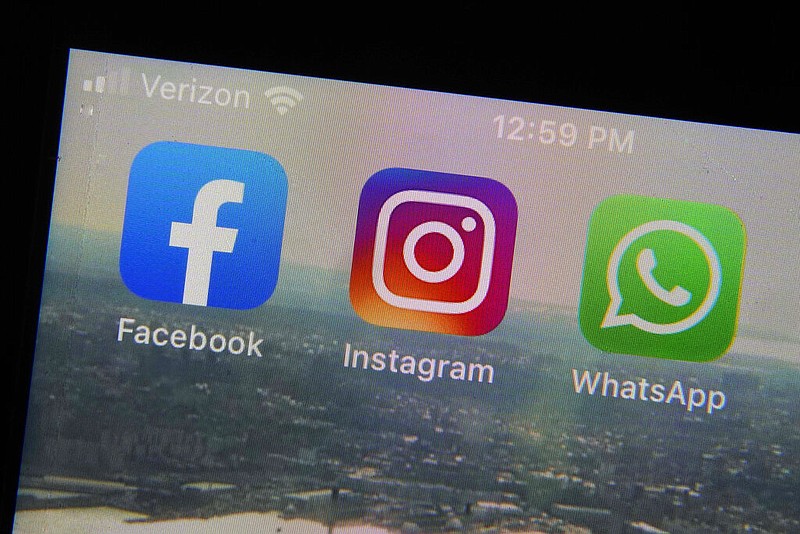The Arkansas Senate on Thursday voted to send to Gov. Sarah Huckabee Sanders a bill that would require age verification for social media users and parental permission for those younger than 18.
After concurring with a House amendment to Senate Bill 396 by Sen. Tyler Dees, R-Siloam Springs, the Senate voted 21-3 to give final approval to the bill. Eight senators voted present and one senator didn't vote on the bill with two other senators absent.
Dees told senators the House's amendment to the bill improved it based on suggestions from Apple, Facebook and Google, and the bill would apply to new accounts and would exempt YouTube.
"The heart of it is to protect children," he said.
Dees said the bill will require reasonable age verification and he believes that reasonable age verification is what happens when people go to vote and buy cigarettes.
But Sen. Ricky Hill, R-Cabot, said he worried the bill would take away freedom that his son, who serves in the Navy, is aiming to protect.
"Parents control what their kids see," he said. "For the young people in America, let's be parents."
Hill said he's also concerned the bill would increase identity theft.
Senate President Pro Tempore Bart Hester, R-Cave Springs, maintained the bill will protect children in Arkansas.
"We have lots of restrictions for minors because we love them," he said. "We put guardrails around our children because we love them."
Dees said children are being preyed upon by predators online.
[DOCUMENT: Read the bill to require age verification » arkansasonline.com/47sb396/]
"Our culture is eroding, and it's happening online," he said, adding that state lawmakers should not bow down to tech companies that profit from the exploitation of children.
Afterward, Yael Ossowski, deputy director of the group called Consumer Choice Center, said in a news release that "Not only does this bill make it more difficult for young people to begin to use the Internet and all the benefits it provides, but it also enshrines into law the idea that governments should pick which social media networks young people can or cannot use rather than parents.
"This bill is paternalistic, sets a terrible precedent for online speech and access, and amounts to nothing more than heavy-handed government control of who is allowed online and when."
"If Gov. Sanders signs this bill, she is aligning with the notion that government should be the final arbiter of whether young people access the Internet at all, and that parents should have diminished say in their kids' digital lives," Ossowski said. "That is fundamentally wrong."
On March 9, Sanders announced her support of the bill.
"Arkansas is finally giving parents the tools to protect their children," the Republican governor said at that time. "We believe parents' rights are paramount, and we won't let big tech's bottom line stand in the line of our kids' safety."
At that time, Sanders said social media has shown to have a negative effect on children's mental health, singling out Meta, the parent company that owns Facebook and Instagram, in particular.
"While social media can be a great tool and a good resource for a number of things, many kids are simply not prepared for the negative aspects of it," she said.
The bill would apply to users after the bill takes effect Sept. 1, requiring social media companies to contract with a third-party vendor to perform an age verification check that would require people to upload a digital copy of a driver's license, a government-issued ID or "any commercially reasonable age verification method" to verify their age. Users younger than 18 will have to get permission from a parent or guardian to have a social media account.
Under the legislation, social media companies are defined as a forum that allows users to upload, create or view content from other accounts and allows users to "interact with other account holders or users, including without limitation establishing mutual connections through request and acceptance."
The bill's House sponsor, Rep. Jon Eubanks, R-Paris, told the House on Wednesday that the bill is aimed at large social media companies such as Meta, and exempts companies "controlled by a business entity" that generates less than $100 million in annual gross revenue. Companies found out of compliance with the bill's age verification requirement could be subject to a $2,500 fine for each violation.
The bill also exempts companies whose "primary purpose is not social interaction," such as LinkedIn. Also excluded from the bill are email providers and companies that provide services such as direct messaging, streaming, online shopping, news, sports, entertainment websites or "other content that is pre-selected by the provider and not user-generated."
A company that "exclusively offers subscription content" also would be exempted from the bill.
Specifically not exempted from the bill is a social media company "that allows a user to generate short video clips of dancing, voice-overs, or other acts of entertainment."
The bill cleared a House committee committee Monday, after two lobbyists from the tech industry testified against the bill.
Ruthie Barko, executive director for Colorado and the central United States for TechNet, a firm that represents companies such as Google, Meta and Apple, said the bill's requirement for people to submit a digital form of an ID would mean uploading sensitive personal information.
Eubanks said third-party identification companies "dump" their data on a "regular basis." "That personal information is not kept," Eubanks said.
Arkansas' legislation is similar to legislation recently passed in Utah. In March, Utah Gov. Spencer Cox signed a pair of bills requiring age checks for users and a social media curfew for children younger than 18, prohibiting them from using social media between 10:30 p.m. and 6:30 a.m.
Information for this article was contributed by Neal Earley of the Arkansas Democrat-Gazette.
